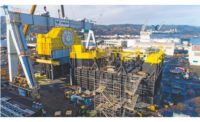Despite initial concerns about the impact of the Kyoto Protocol, two Alberta oilsand developments are proceeding unhindered, while a third is citing Kyoto-related costs as only one of several factors in its decision to cut back plans.
Paris-based TotalFinaElf on Jan. 6 announced its acquisition of a 43.5% stake in the 544-sq-km Surmont oilsands permit as part of a joint venture with Houston-based ConocoPhillips. While regulatory approvals still are required, development of the estimated 5- to 10-billion-barrel permit could start by the end of this year and be operational by 2006, says ConocoPhillips Calgary spokesman Peter Hunt.
That announcement followed Calgary-based Suncor Energy Ltd.'s announcement that approximately 75% of its projected $657-million 2003 capital budget will be allocated to its oilsands projects.
"Not only Suncor is moving ahead, but TotalFinaElf has joined the game. It's a major vote of confidence," says analyst Wilfred Gobert with the Calgary-based Peters & Co. investment firm.
While Calgary-based True North Energy Corp. has deferred a $2.35-billion redevelopment of its Fort Hills oilsands projectciting ratification as one reason--Gobert doesn't believe it will have a major impact. He predicts other producers will move ahead with their projects as uncertainty about Kyoto eases.
Energy analyst Amir Arif with Arlington, Va.-based Friedman Billings Ramsay Group Inc. agrees. "We're not out of the woods yet, but I think capital will flow back into the business as costs become better defined."
Last month the Canadian parliament ratified the Protocol, which commits Canada to reduce its greenhouse emissions to 6% below 1990 levels between 2008 and 2012, a 240-megatonne or a 20% reduction from current levels (ENR 12/23/02 p. 12). Producers had warned the emission reduction costs might be unmanageable, and the Alberta government had sponsored a media campaign against ratification.
Now Suncor says those reduction levels won't be a threat and estimates its Kyoto-related costs at between 13� and 17� a barrel by 2012. Those estimates are based on commitments by Natural Resources Canada minister Herb Dhaliwal that reduction level costs will be capped at $9.80 per tonne and that oil and gas producers won't have to reduce emissions by more than 15% below projected business-as-usual levels for 2010, says company spokeswoman Darlene Crowell.
Suncor's oilsand spending this year will include about $197 million in ongoing construction at its 1,000-acre leased Firebag site and the construction of a $128-million new vacuum unit for its upgrader. Combined, the two projects are expected to increase oilsands production capacity to 260,000 barrels per day in 2005. Approximately $141 million more will be spent on maintenance and upgrades to existing facilities, says Crowell.
Syncrude Canada Ltd., Fort McMurray, Alberta, still is assessing its Kyoto costs. But it's continuing with a Stage 3 development of its Aurora mine, including the $460-million construction of a second production train, which will be completed by the end of this year, says spokeswoman Cherry Holand.
Kyoto, a tight capital market and the 50% to 75% cost overruns in recent years experienced by established producers are the reasons TrueNorth has placed Fort Hills on hold, says spokeswoman D'Arcy Levesque. "Banks are very reluctant to lend (money) in this climate."
There is no timetable for reactivating the project, although TrueNorth will regularly review its decision and look for a joint-venture partner to share the financial risk. Approximately $78 million in exploratory drilling has shown the Fort Hills site has 2.8 billion barrels of reserve. It will have a 190,000-barrel-a-day capacity when fully developed, says Levesque.


Post a comment to this article
Report Abusive Comment